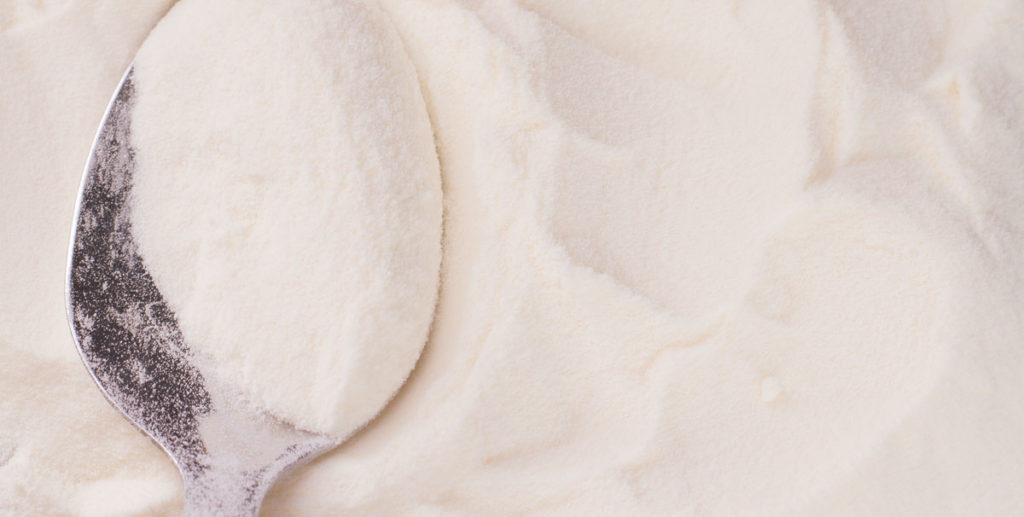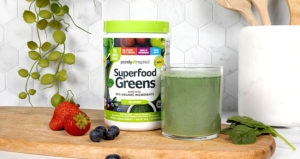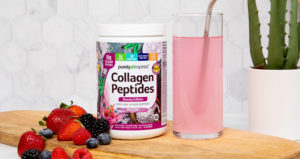If you’ve been scrolling on social media of late, you’ve probably come across posts from celebrities and influencers who have been touting the many benefits of collagen.
The overall interest in collagen has increased dramatically this year, and people are now searching for collagen almost 1.5 million times each month, which is a 35% increase from last year.
So, if you’re one of the millions of people who are curious about collagen and the potential benefits of this ingredient, we’ve got you covered with everything that you need to know about collagen.
All About Collagen
A hard, insoluble, and fibrous protein, collagen accounts for approximately 30% of your body’s protein composition. This makes collagen the most abundant protein in your body.
One of the major building blocks of bones, skin, muscles, tendons, and ligaments, collagen provides structure to much of your body. That’s because in most collagens, the molecules are packed together to form long, thin fibrils, which act as supporting structures and anchor cells to each other. This is what gives your skin strength and elasticity. And since collagen is resorbable, it can be broken down, converted, and absorbed back into your body.
Types Of Collagen
There are at least 16 different types of collagen, but the majority of them belong to types I, II, III, and IV. The collagens in your body are strong and flexible, and each different type of collagen has different structures and functions.
Type I accounts for 90% of your body’s collagen and is made of densely packed fibers. It provides structure to your skin, bones, tendons, fibrous cartilage, connective tissue, and teeth. Gram-for-gram, type I collagen fibrils are stronger than steel.
Type II is made of more loosely packed fibers and found in elastic cartilage, which cushions your joints. Type III supports the structure of muscles, organs, and arteries. And type IV helps with filtration and is found in the layers of your skin.
Aging and Collagen
As you age, your body produces less and lower quality collagen. This can lead to a decline in the structural integrity of your skin. So, as you age, chances are that your skin will become less firm and supple, and your cartilage will weaken, as well.
However, while your body will gradually make less collagen as you age, collagen production drops most quickly due to excess sun exposure, smoking, excess alcohol, and a lack of both sleep and exercise. Environmental stressors such as pollution and free radicals can also diminish collagen production and damage collagen fibers over time, reducing their thickness and strength. This may then lead to wrinkles on your skin’s surface and reduce skin elasticity.
What Are Collagen Peptides?
Collagen peptides are a soluble supplement derived from marine or bovine protein. In layman’s terms, they’re basically very small pieces of protein from animal collagen. And since they’re derived from pure collagen, collagen peptides contain the same amino acids that are found in the gelatin of bone broth. They also contain eight of the nine essential amino acids.
High in proline, glycine, and hydroxyproline, collagen peptides are easily absorbed within your body.Most peptides are also flavorless and dissolve completely in hot or cold liquid. This gives collagen peptides the added benefit of allowing people to add them to their smoothies, hot coffee, cold brew, or soups.
Plus, collagen peptides are bioavailable (able to be absorbed and used by the body) when compared to collagen. This means that collagen peptides can be absorbed into your bloodstream in a better way since they have a shorter chain containing amino acids when compared to gelatin and collagen.
Collagen Peptides and The Collagen Hydrolyzation Process
Collagen peptides are made by breaking down whole collagen proteins into smaller pieces through enzymatic hydrolysis of collagen. Hydrolysis is the process that the collagen peptides go through in order to be broken down into smaller chains that contain amino acids. During hydrolysis, water molecules rupture the chemical bonds.
Hydrolyzed collagen (also known as collagen hydrolysate) is just another name that is given for collagen peptides. ‘Hydrolyzed’ simply means that the amino acid chains have been broken down into smaller units. Most collagen peptides contain a hydrolyzed type 1 collagen, which is extracted from hides, bones, or fish scales.
A result of collagen peptides being fully hydrolyzed is that they are readily broken down into a form that can enter into your bloodstream within a short period of time soon after the digestion process.
Nutrients That Help Increase Collagen Production
Your body makes procollagen, which all collagen starts off as, by combining two amino acids – glycine and proline. Since this process uses vitamin C, you may be able to help your body produce this important protein by consuming nutrients like vitamin C, as well as several others, that boost collagen production.
High-protein foods such as fish, poultry, meat, eggs, dairy, legumes, and soy are believed to nurture collagen production because they contain the amino acids that make collagen – glycine, proline, and hydroxyproline.
In addition to egg whites, large amounts of proline are found in dairy products, cabbage, asparagus, and mushrooms, while large amounts of glycine are found in pork skin, chicken skin, and gelatin.
Collagen production also requires nutrients such as zinc, copper, and vitamin C, which is essential for producing collagen.
Citrus fruits, papaya, green leafy vegetables, and superfoods such as bell peppers, strawberries, and broccoli all contain large amounts of vitamin C. Meanwhile, zinc is found in shellfish, legumes, meats, nuts, seeds, and whole grains, while large amounts of copper are found in organ meats, sesame seeds, cocoa powder, cashews, and lentils.
Also, try your best to minimize your consumption of added sugar and refined carbs. That’s because eating too much sugar and refined carbs can damage collagen since sugar interferes with collagen’s ability to repair itself.
*The links used in this article are being provided as a convenience and for informational purposes only; they do not constitute an endorsement or an approval by Iovate Health Sciences International Inc. or any of its affiliates (“Iovate”) of any of the products, services or opinions of the corporation or organization or individual. Iovate bears no responsibility for the accuracy, legality or content of the external site or for that of subsequent links. Contact the external site for answers to questions regarding its content.






